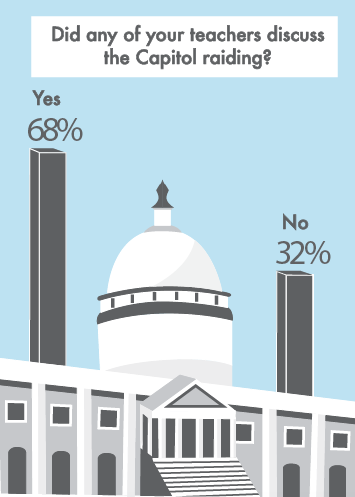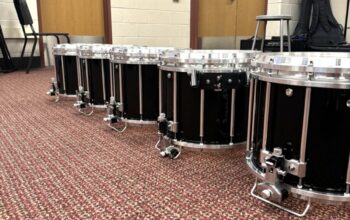Caroline Vincent, News Editor
@cvincentcourant
On January 6th, hundreds of Trump supporters violently stormed the U.S. Capitol during the electoral college certification. Legislators and staffers were put in danger, as the most recognized symbol of democratic government was being breached by Americans. Proceeding the raiding, teachers were left with the tough task of how to address the topic in the classroom. Some students wanted to have open conversations with adults, while others felt more comfortable not discussing it at all. This left teachers grappling with how to approach discussing an important yet sensitive topic in a classroom setting.
Some teachers avoided addressing the raiding because they did not want to add stress to the preexisting stress from midterms and COVID-19. Other teachers, including Language teacher Amanda Surdenik, did not feel that it was their place to have an open discussion with their class. “I simply noted that they might have strong opinions or feelings about what happened, and I was available to talk about it if they wanted to,” Ms. Surdenik said. “We talked about being respectful in discussing the events with other people and remembering that everyone is entitled to their own opinions.”
Some teachers, specifically those who teach history, felt that it was essential to discuss such an impactful historical moment. “This is the first draft of history… and I am a history teacher,” Jessica Browner said. “It would be a dereliction not to address events that are so antithetical to how our democracy works.”
Civics teacher Kristine Goldhawk felt the same way. “As a Civics teacher, it was crucial for me to debrief students and make sure they understood the dividing line between protected speech versus unprotected speech, protesting versus rioting,” Ms. Goldhawk said.
History teacher Michael Staffaroni came up with a creative way to talk to his students. “I started the next U.S. History class I had after it happened with an emotions graffiti wall. I activated a whiteboard on Zoom, and students wrote what they were feeling or what their reactions were after seeing the events of the 6th,” Mr. Staffaroni said. “There were several comments regarding the shock, disbelief, and even fear that the Capitol riots caused.”
Mr. Staffaroni continued to talk about the consequences of the insurrection to his class in the weeks following. “We continued noting the consequences of these events,” Mr. Staffaroni said. “We discussed the impeachment and impending trial, the arrests, and the widespread rejection of these events.”
“Educating students is more than just the teaching of specific content; it is about the growth of the whole child who is and will become important members of our society. The need to understand how democracy works and the importance of an educated electorate is a fundamental value and necessity of our society,” Mr. Staffaroni said.
Mr. Staffaroni believes that all teachers should feel welcome to address the Capitol raiding, as he thinks that teachers must educate students to be informed members of society. “We focus on the multiple aspects of our students and not just the facts and skills we teach, all faculty at NCHS should feel open to meet their students where they are in addressing these topics,” he said.
Legally, teachers have the right to talk about politics and other controversial topics. Still, it is often avoided, as the current polarizing political climate has made it challenging to have a civil discussion. Junior Delaney Smith noted the difficulty teachers face when talking about current events. “I think this political climate makes it difficult to talk about current issues. Most people would rather not start an argument or make someone uncomfortable. This polarizing divide makes it difficult to have a friendly conversation about current events,” Delaney said.
Some students were disappointed when they came into school on January 7th and none of their teachers addressed the Capitol raid. This brings up the question: Should NCHS mandate that teachers need to talk about current events?
Delaney does not think that the school should require that teachers address current events like the Capitol raid. “Not all teachers will feel comfortable talking about politics, but it would be great if the school could recommend opening up a dialogue,” Delaney said.
Robert Stevenson, who teaches AP Psychology, used the events in his class to explore social psychology concepts that were on display at the raiding. “We did not look from any one political or job perspective, but small groups of students looked broadly to see where some of these concepts could have played a role in shaping thinking and behaviors that day,” Mr. Stevenson said. “I leveraged high student interest in the events of the 6th to teach and emphasize concepts that can help us to understand through the lens of social psychology some of the really wide range of human behavior that was on display that day.”
Michael Joshi had a unique perspective when talking to his AP Government students, as he had previously worked in the Capitol as a Legislative Correspondent and Systems Administrator. “It was extremely personal,” Mr. Joshi said. “The Capitol was my workplace. When I first saw the images, it was heartbreaking because I immediately thought of friends who still work there, and I was worried about their safety.”
Mr. Joshi acknowledged that it could be a difficult topic for other teachers to talk about, as most people have strong opinions. “I think it is dangerous to try and pretend you can be unbiased,” Mr. Joshi said. “Everyone has a bias. If you do not recognize it, you are being manipulated. I try to be open and honest with my students. It’s hard because you don’t want to seem like your preaching or saying my side is right, and if you disagree with me, you’re wrong.”
When talking to his classes, Mr. Joshi shared a story about what the Capitol meant to him, rather than focusing on politics. He wanted them to understand that it was an attack on who we are as a democracy. “I walked out of each class feeling a lot better than I did going in, and I can only hope that the students felt the same way,” Mr. Joshi said.




